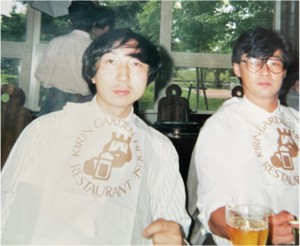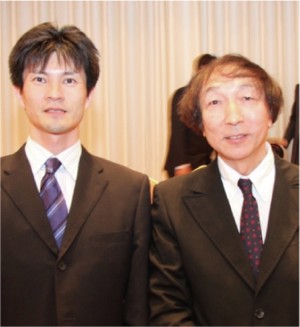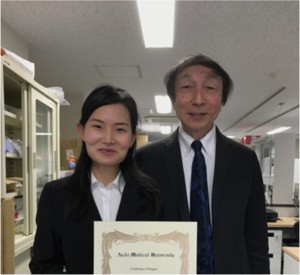Professor Kazuo Umezawa
Professor Kazuo Umezawa passed away on January 12, 2024, at the age of 77. Professor Umezawa was born in Tokyo as the first son of Professor Hamao Umezawa. He was educated at the University of Tokyo and received a Bachelor of Science from the University of Tokyo in 1969. Then, he went on to graduate school at Massachusetts Institute of Technology (Prof. J. C. Sheehan) and received a Ph.D. in Chemistry in 1973. Dr. Umezawa also graduated from Lincoln College, University of Oxford (B.A. in 1976 and M.A. in 1979 in Natural Science).
He joined the Institute of Medical Science at the University of Tokyo as an assistant professor in 1977 and searched for carcinogens and studied their mechanisms of action. In 1979, he stayed in the laboratory of Professor I.B. Weinstein at Columbia University, where he elucidated the mechanism of action of the new tumor promoter teleocidin, which he published in Nature as the first author.
In 1987, he moved to the Institute of Microbial Chemistry as a deputy director, and he conducted research on natural compounds that are produced by microorganisms and that target signal transduction.

In 1989, Dr. Kazuo Umezawa joined the Department of Applied Chemistry, Faculty of Science and Technology, Keio University, as a professor and continued and developed his research on “exploration and application of small-molecule signal transduction inhibitors.”
Until his retirement from Keio University in 2012, he consistently achieved outstanding results in the search for active substances from microorganisms and plants and their synthesis, molecular design, and derivative synthesis. In 2003, Professor Umezawa discovered that the known alkaloid conophylline induced the differentiation of insulin-producing pancreatic cells. This discovery provided new insights into a new approach to using small molecules in pancreatic regenerative medicine for type 2 diabetes.

Another of Professor Umezawa’s major achievements is his research on dehydroxymethylepoxyquinomicin (DHMEQ). Professor Umezawa discovered the NF-κB inhibitor DHMEQ in 2002, which has anti-inflammatory and anti-cancer effects, and demonstrated its usefulness in many animal experiments. DHMEQ is used by researchers around the world to analyze the mechanisms of disease, and its development has already begun in companies. In particular, the discovery of DHMEQ has had a significant impact on the clinical system, leading to the establishment of Keio University’s first drug discovery venture, Signal Creation, with DHMEQ as its main seed, and contributing to the commercialization of university seeds. Indeed, DHMEQ has been developed as an anti-atopic inflammation cream in China and has been applied in clinical trials for intraperitoneal therapy in Russia.
Following his retirement from Keio University in 2012, he moved to Aichi Medical University, and he continued to uncover new antitumor compounds using several cellular models. For example, migracins A and B, isolated from Streptomyces sp., showed remarkable inhibitory effects on the migration and invasion of ovarian clear-cell carcinoma cells. Moreover, Migracin A also showed the ability to inhibit the formation of new blood vessels.
In addition to antitumor compounds, he isolated cyclopenin from deep sea Aspergillus, which possessed not only anti-inflammatory activity but also the ability to ameliorate learning deficits in flies. Terfestatin D was isolated from Actinomycete SF2911 as an inhibitor of LPS-induced NO production and also exhibits anti-cancer activity.
He further modified DHMEQ’s structure to create SEMBL, a more stable compound, and discovered its potential as a new NF-κB inhibitor. He also worked on applying conophylline as an anti-fibrotic drug.
Beyond his research, he applied basic science to practical applications and served as an advisor across many fields. He participated in collaborative research to develop anti-inflammatory products from the plant Kumazasa and guided young scientists in screening compounds for anti-hepatitis virus activity and exploring treatments for endometriosis alongside clinical doctors.
Professor Umezawa contributed significantly to The Journal of Antibiotics as a member of the Editorial Board, as well as an Emeritus Editorial Board member (1987–2023), and served as the councilor of the Japan Antibiotics Research Association (1987–2023). Professor Umezawa has also contributed significantly to the advancement of cancer chemotherapy, serving as a councilor and director in such organizations as the Japanese Cancer Association and the Japan Association of Molecular Target Therapy of Cancer. Notably, in June 2008, he served as the president of the 12th Annual Meeting of the Molecular Target Therapy of Cancer Conference, organizing the event under the slogan “From Chemistry to Biology, From Biology to the Clinic” in the context of cancer molecule-targeted therapy. Through this conference, he successfully integrated chemistry and biology into the field of cancer chemotherapy. He also served as the Asian Editor-in-Chief of Oncology Research until 2024 and is now an Emeritus Editor-in-Chief.

Professor Umezawa was a distinguished scientist and made outstanding achievements in drug discovery, mainly from the study of microbial origin and analysis of disease mechanism using his compounds. He published ~550 research articles, reviews, and book chapters. He was a great mentor to his students and young scientists in the fields of both antibiotic research and anticancer chemotherapy research, and his laboratory members and students respected him very much. Thus, his laboratory at Keio University was very popular with students, and it was very difficult for students to get into his laboratory. Further, many of his laboratory’s graduates are now active in academia and private companies.
He enjoyed playing many sports, including skiing, tennis, and swimming, with his students and family. He also had a fondness for driving and smoking a pipe. We always looked forward to playing sports with him, enjoying flavors from his pipe, and discussing with him in the passenger seat.
We pray for his peaceful eternal sleep while celebrating the stellar achievements of our respectful mentor, Professor Kazuo Umezawa.



